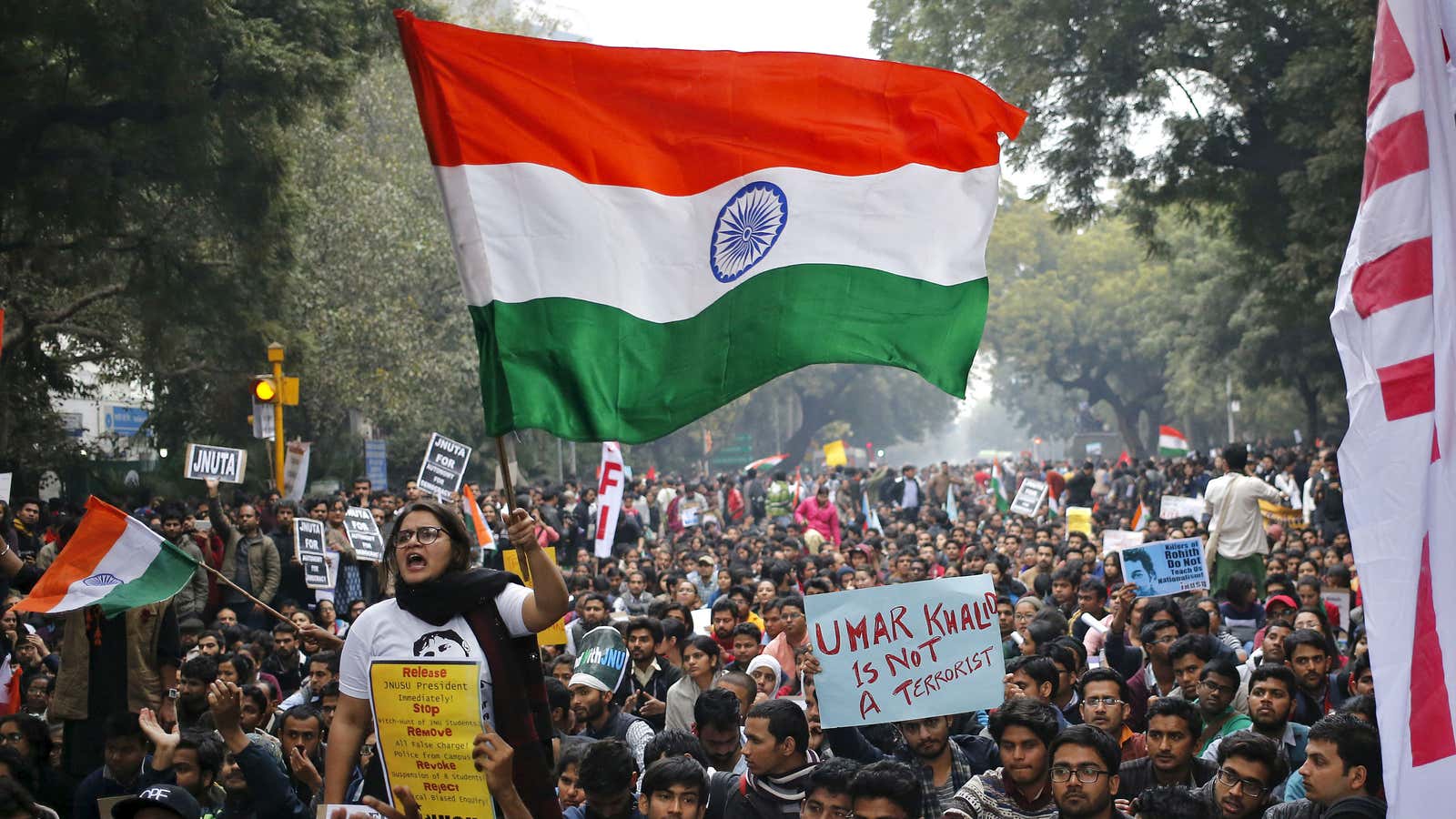This item has been corrected.
Just days after it showed the world that democracy is more important than Facebook’s free internet offer, India’s government regressed deeply last week by arresting Jawaharlal Nehru University (JNU) students’ union leader Kanhaiya Kumar on charges of sedition.
Rated the country’s best university in 2012, JNU was established by the Indian government in 1966—two years after the death of the country’s first prime minister whose name the institution carries. Today, JNU is considered one India’s leading liberal places of higher learning.
On Feb. 9, a gathering was organised on the university campus to mark the third anniversary of the hanging of Mohammad Afzal Guru, a Kashmiri convicted for the conspiracy surrounding the 2001 attack on the Indian parliament.
The event—also meant to express solidarity with Kashmiri migrant workers—was initially authorized (pdf) as a poetry reading event. But the permission was withdrawn after details of the nature of the event emerged.
Students nevertheless went ahead with the rally, where some participants allegedly raised anti-India slogans. This was reported to the police by those affiliated to the Akhil Bharatiya Vidyarthi Parishad (ABVP), the students’ wing of the Bharatiya Janata Party (BJP) that runs the Indian government under prime minister Narendra Modi.
On Feb. 12, Kumar was arrested on charges of sedition for delivering a speech during the rally. Delivered in Hindi, the speech—translated and published in full by the Kolkata-based Telegraph newspaper—expresses strong opinions against the BJP and its ultra-nationalist, Hindu-supremacist parent organisation, the Rashtriya Swayamsevak Sangh (RSS). Kumar said:
What I mean to say is that we don’t need the certificate of patriotism from the RSS. We don’t need a nationalist certificate from the RSS. We belong to this country. We love this country. We fight for the 80 per cent of the poor population of this country. For us, this is nation worship.
His long, passionate speech did not urge listeners to use any form of violence against Indian institutions. Nor did it contain anti-India references. However, the police felt it was a safety threat and applied an article of the 1860 Indian Penal Code (124A) which defines the culprit of sedition as:
Whoever by words, either spoken or written, or by signs, or by visible representation, or otherwise, brings or attempts to bring into hatred or contempt, or excites or attempts to excite disaffection towards, the government established by law in [India].
While this might have looked like a reasonable description of sedition to the British colonial regime, it does not particularly fit a democratic country: Britain itself has done away with the law, and currently only a handful of countries in the world, including Saudi Arabia and Iran, still have them.
In fact, this outdated definition of sedition could well be used as a definition of free speech. The Indian government’s decision to arrest Kumar by applying the law has been seen as a worrisome attempt at deterring free speech and political opposition using this law.
On Feb. 17, Kumar was beaten up by a group of lawyers on the Patiala House Courts premises in Delhi ahead of his hearing. None of the attackers was detained. Kumar was then refused bail and sentenced to a 14-day detention.
The row has generated heated political response: on one side are the government’s supporters justifying the arrest and labeling as “traitors” all those who defend Kumar’s freedom to express his view; on the other side are the liberals accusing the government of curbing dissent and opposition.
On Feb. 19, the supreme court of India refused to hear Kumar’s bail plea. It, however, admitted that the Patiala House Courts may not be the right place for him to approach due to security reasons, and instead directed him to the Delhi high court.
A day before, on Feb. 18, a reported 10,000 people marched in Delhi to protest the government’s actions. Intellectuals, scholars and students in universities around India, as well as in places across the world, have expressed solidarity with Kumar and JNU.
Amid the highly charged atmosphere, the government, on Feb. 18, decided that all central universities must ”proudly and prominently” hoist the Tricolour—India’s national flag—in their campuses to instill ”national and pride”. Inexplicably, it also prescribed the exact height of the mast—207 feet.
The last time a union leader from JNU was arrested for expressing his views was during Indira Gandhi’s controversial Emergency regime between 1975 and 1977, when civil liberties were curtailed and several atrocities committed.
Yet, this is not the first time that the sedition law has been used against individuals in independent India. There have been several such instances even in recent times. In October 2015, Hardik Patel, a Patel community leader from Gujarat, was booked under the draconian law. In September 2012, the police in Mumbai arrested a cartoonist using the same law.
Due to its regular misuse and ever expanding scope—as deemed fit by successive governments—domestic as well as international voices have often demanded the repeal of this British-era law.
Correction: The gathering at JNU happened on Feb. 9.




